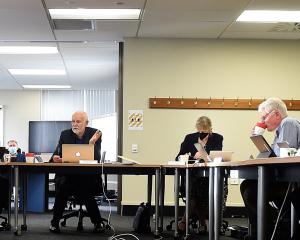The Southern District Health Board failed to file a submission before convicted fraudster Michael Swann faced the New Zealand Parole Board last month.
SDHB chief executive Carole Heatly said yesterday the board was ''not aware'' Swann (51) had appeared before the parole board on June 13 until it was reported in the media.
The board was ''previously of the understanding'' that Swann was to appear in front of the board this month, she said.
A letter was sent to the parole board on June 10, asking for an indication of when Swann's hearing would be and advising that the health board wished to either make a written submission or present an oral submission at the hearing.
The parole board received that letter on the day of the hearing, which resulted in Swann being set for release on the proviso his Christchurch accommodation was found to be suitable. During this adjournment, a submission - signed off by SDHB chairman Joe Butterfield - was sent to the parole board on June 17 asking for it to be considered by the board.
The health board submission noted ''as the victim of his very significant offending - the largest financial fraud in New Zealand's history to date at the time of his trial - the Southern DHB had had no opportunity for input on the proposal that he be granted parole''.
The health board also noted in its submission that after the parole board gave Swann an indication he would be paroled - ''it may be unlikely to reverse its decision based on this subsequent submission''.
''The board does not wish to be in any way critical of the parole board's decision-making process,'' it noted, before asking the parole board to exercise its discretion under the Parole Act.
Earlier this week, the parole board confirmed Swann would be released from prison on July 31.
The SDHB's three-page submission was later noted by the board in its parole decision.
Parole board chairman Justice Warwick Gendall QC said ''the board's decision of 12 July, 2013, carefully evaluated all relevant legal issues necessary when making a parole decision, including the views of the victims''.
Anyone was able to make a submission to the board about an offender, but only registered victims were automatically advised of a pending hearing, sent information about the offender on request from the Department of Corrections, and advised of the outcome, Justice Gendall said.
''In all its considerations, the board must, under the Parole Act 2002, recognise the rights of victims, and due weight is given to victim submissions and any restorative justice outcomes.''
Health Minister Tony Ryall was not available to comment on Swann's pending release, a spokeswoman said.











